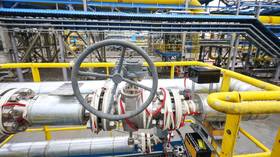Effects of anti-Russia sanctions on UK consumers revealed – media

The threat of energy sanctions against Russia, which could be imposed in the case of an invasion of Ukraine, may see the UK face record gas and petrol prices, British ministers have been warned, The Times has reported.
According to the British newspaper, senior officials in Whitehall expect the Kremlin to “weaponize” its vast natural energy resources by restricting supplies of gas to Europe.
Citing an anonymous senior official, the Times noted that the UK barely imports any Russian gas, but is exposed to the risk of rising wholesale prices, which could potentially cause a serious problem for the country. Other European nations, such as Sweden and Finland, are almost wholly dependent on gas imports from Moscow.
Western nations, including the UK, have warned Moscow of dire consequences in the event of an invasion of Ukraine, including severe economic sanctions. The threat comes as Russia stands accused of placing 100,000 troops on the border, allegedly with the intent to enter Ukraine. The Kremlin has repeatedly denied suggestions it plans to invade, staying that it has the right to move military on its own land as it sees fit.
On Monday, America’s CNN reported that US President Joe Biden had started discussions with a number of countries and companies in Europe, the Middle East, North Africa, and Asia to form a plan that would allow Washington to export more liquefied natural gas, in the event that an invasion leads to gas shortages.
According to Eurostat, the official statistical office of the European Commission, the EU imports 41.1% of its gas from Russia.













